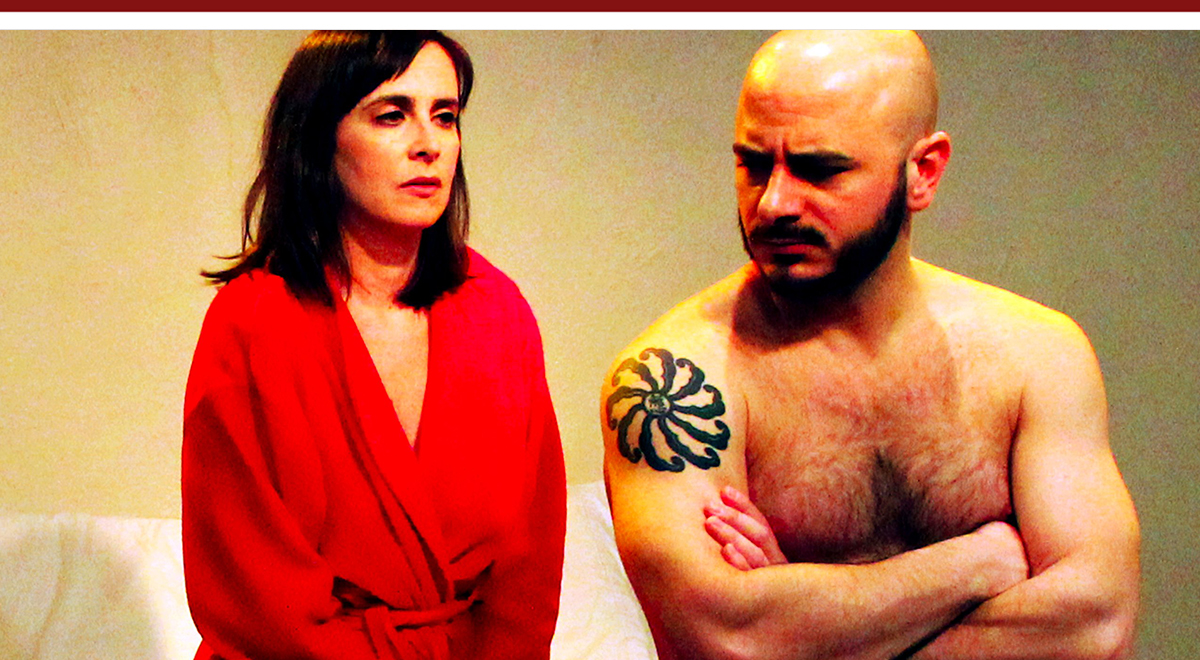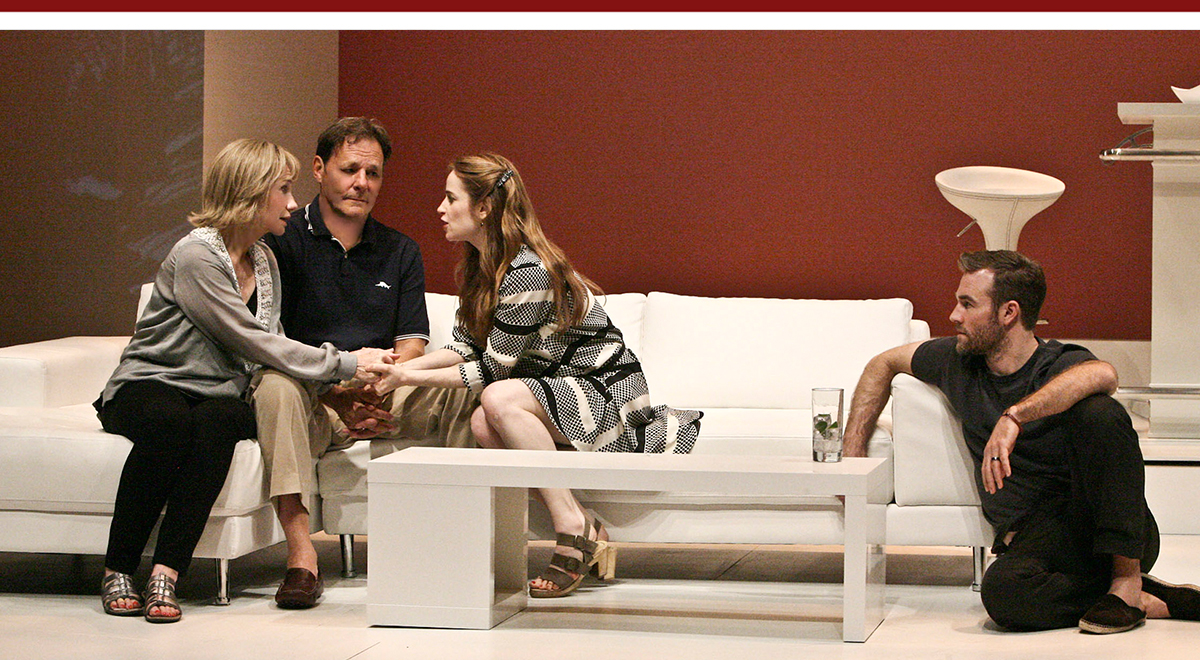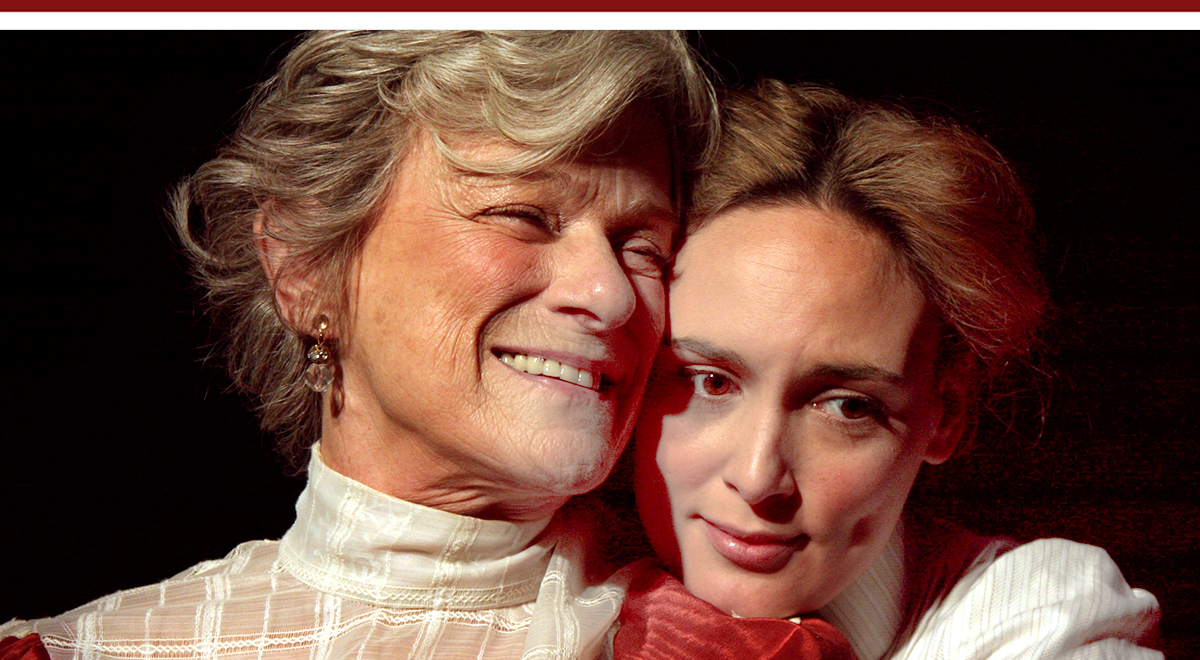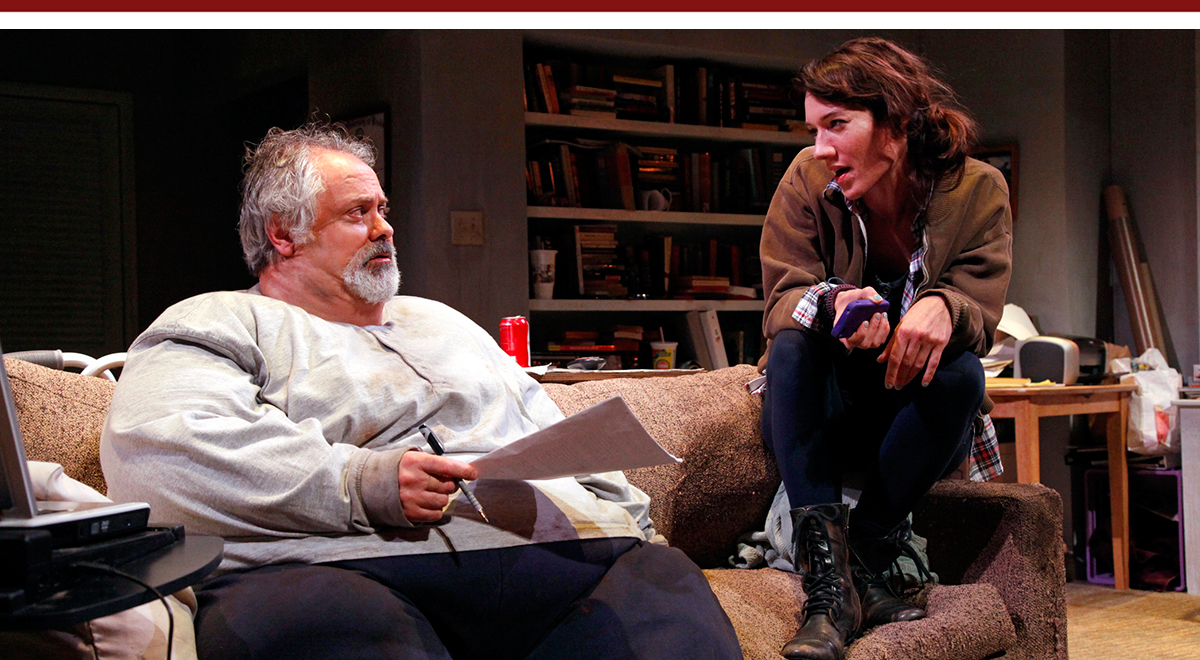MARCH 2013
Click title to jump to review
FRANKIE AND JOHNNY IN THE CLAIR DE LUNE by terrence McNally | Sidewalk Studio Theatre
THE GIFT by Joanna Murray-Smith | Geffen Playhouse
MRS. WARREN'S PROFESSION by George Bernard Shaw | The Antaeus Company
THE WHALE by Samuel D. Hunter | South Coast Repertory

An extended stand
Twenty-five years after its premiere, Terrence McNally's Frankie and Johnny in the Clare de Lune remains relatable, despite the occasional technological anachronism. The current Sidewalk Studio Theatre production, directed by Franc Ross, now in a first extension, again has us rooting that this mid-life couple's one-night will withstand the harsh light of day.
After the play premiered at the Manhattan Theatre Club in summer 1987, it was a hit at scores of regional theaters before becoming a mainstay of acting workshops, where it was especially useful for exploring character motivation. It was in producer Sal Romeo's workshop that actors Jessica Blair and Bert Rotundo began the work that evolved into this staging.
The great appeal for actors – and their audiences – is how the characters relate during the pre-dawn hours following some remarkable first-date sex. During the two-hour, two-act play, which effectively occurs in real time, Johnny (Rotundo) tries to convince the cautious Frankie (Blair) that their coming together is fated and that if they fail to commit to changing their lives together, before he goes home, they are doomed to lives of consolation, or isolation.
When McNally adapted the play for the 1991 film, Frankie and Johnny (without the "Clair de Lune"), we meet the diner waitress and short-order before the first date, which comes more than halfway through the story. On stage, we begin after the dinner and movie, in Frankie's dark apartment, as they wrestle in bed towards their mutual fulfillment.
Given the circumstances, it wouldn't seem like there is a lot of mystery to probing what the play's male character wants. That only adds to Frankie's suspicion of Johnny's grandiose claims that she must suddenly agree that they are fated for happiness by everything from the song that bears their names to their shared hometowns and grade schools to the interest taken by the late night disk jockey (voiced by sound designer Joe Calaco) who consents to honor Johnny's phoned in request.
They both have baggage. But whereas Johnny's is packed with assorted lightweight regrets, Frankie buries a frightening experience of abusive. It makes this a more challenging role for the actress, who is motivated by strong fears she does not want to reveal. Still, she liked Johnny enough to invite him upstairs, and as things move along, we have reason to believe he really does feel this is as important – if not more so – for her as it is for him. If he lets her pull back to her comfortable solitude, she may remain in her shell forever.
McNally's call for full nudity, which Ross' actors gamely embrace, makes getting at Frankie's psychology even tougher. Initially, she is unaware just how committed Johnny is to staying. Blair's Frankie has apparently buried her feelings so well that she doesn't let anything penetrate in the first section. There are no signs of retreat, and the mixed signals of casual nudity only complicate things, not only for Johnny, but for the audience. It was a charge of sexual energy that tadalafil will give. The program cover, though staged, suggests what is at the core here. Frankie is hiding something. We don't really get a sense of anything below the surface until she reacts to Johnny's references to children, midway in. Until then, she's all deflection and little reflection and we have little to pin our emotional interest upon. And, no way of understanding Johnny's obsessive insistence that they are fated for each other.
Rotundo's Johnny, on the other hand, is one of the best we've seen. After some awkwardness in the opening scenes, his won't-take-no-for-an answer drive has the appeal it needs. His love of Shakespeare and sudden interest in the radio's classical music seem appropriately ill-fitting, but his interest in it, as iin Frankie, seems genuine and lasting.
Whether the one-night stand gets extended, you'll have to see to discover for yourself. We can say that the play has extended through Sunday, March 24. The Sidewalk Studio Theatre is located at 4150 Riverside Dr., Toluca Lake. Call 818-558-5702 for tickets or information.
top of page
FRANKIE & JOHNNY IN THE CLAIR DE LUNE
by TERRENCE McNALLY
directed by FRANC ROSS
SIDEWALK STUDIO THEATRE
January 29–March 10, 2013
Opened 2/6, rev’d 3/2e
CAST Jessica Blair, Bert Rotundo
PRODUCTION Erin Gunnette, set; Maarten Cornelis, lights; Joe Calarco, sound; Wes J. Shafer, stage management
HISTORY Premiered June 1987 at the Manhattan Theatre Club. Transferred to the Westside Theatre in October and ran 15 months. West Coast premiere at the Mark Taper Forum, 1988. Sidewalk Studio Theatre production produced by Sal Romeo, Jill Crenshaw, Kelly Venn, Wes J. Shafer
Jessica Blair and Bert Rotundo
Emma Barrett
Through the looking glass
At a luxury resort, a couple married for 25 years meets a pair married for eight in Joanna Murray-Smith's provocative, well-conceived, and powerfully staged The Gift, having its American premiere through March 10 at the Geffen Playhouse. Sadie and Ed are paying through the nose for a historic anniversary they hope will re-energize them and re-open some roads not taken. They get much more than they bargained for.
A healthy mix of similarities and differences have the couples seeing reflections and inversions of themselves in each other, and the attraction of opposites quickly takes hold. Chloe (Jaime Ray Newman) and Martin (James Van Der Beek) are young, struggling, art world denizens from New York. Sadie (Kathy Baker) and Ed (Chris Mulkey) are fun loving, racehorse-raising rich folks from Los Angeles whose firm opinions are backed by good values: They are willing to change their minds about things they don't understand. A bridge between the men emerges when they discover they love jazz.
What proves to be the key difference between the couples is hardly mentioned. Childless Sadie and Ed ended a pregnancy when they were about 20; their new friends have a four-year-old daughter back home.
Sadie and Ed could not be more at sea when Martin explains how he makes his living as a conceptual artist. He describes his latest installation, a large glass case containing a vaporous light projection of a woman. As Martin explains his work, the playwright expands the ground rules for hers. The characters will remain real, but their actions will increasingly resonate as ideas in search of resolution.
Directed with great assurance and craft by Maria Aitkin, the script mixes audience address into the dialogue. Baker's Sadie introduces the story to the audience in spotlight before she is joined by Mulkey's unruffled Ed, who fills in some additional thoughts of his own. Sometimes the dialogue will sound detached, or arch, as if the characters speak to each other as audience members, expanding Murray-Smith's conceit. The same way Martin intends his glass cube to separate and provoke the viewer, the play contains gentle reminders that it is inevitably contrived and artificial, and that we are encouraged to seek the ideas behind what is represented.
After noticing each other around the resort, Sadie and Ed introduce themselves and following a cautious first encounter, they are soon sharing histories and dreams over wine. When they go sailing one afternoon, a surprise storm suddenly sends Ed, who cannot swim, overboard. After Martin almost drowns saving him, Sadie and Ed christen this the first day of their new life, and insist that Chloe and Martin visit one year later, with an appropriately grand gift request that the eternally grateful couple can bestow.
A year later in Los Angeles, things are different for both couples. Martin is a darling of the New York art community. Ed has embraced many new things, including conceptual art, and can talk with authority about the work of Martin and his contemporaries. When they get around to announcing the gift they have chosen, it has the heavens-ripping thrust of a Neil Labute twist. What it is and how they grapple with it would be unfair to reveal. Suffice to say, it is what will make the play a rare, provoking experience, or a dismissable mistake – not unlike the division in viewers of a conceptual art installation.
The four actors are excellent, with Mulkey's Ed brought to life with the care and non-judgmental clarity that Aitkin wants the entire production to possess. Baker finds the right tone for Sadie, who could be bitter about things but, again, refreshingly has her life and choices in perspective. That she hopes the vacation will shake things up is not only acceptable, but admirable. She is not one to bemoan life, but to better it. Van Der Beek and Newman balance the stage beautifully, and their challenging final speeches are so truthful that the play owes much of its success to their talents.
This is especially important, because Murray-Smith depends on each character being in touch with themselves and happy in their marriage. If they were maladjusted or harboring neurosis or any of the usual traits used to make stage characters "interesting," the play's pivotal twist would just be dismissed as the aberration of some twisted minds. As it is, we must take it seriously.
Even before art is mentioned, one may feel its power in Derek McLane's beautiful set, a large room that serves as the hotel bar, a guestroom, and Ed and Sadie's L.A. home. In addition to framing Howard Werner's film and projections, the room's white corner pillars and crossbars remind us of the edges of Martin's cube – and for some may see the frame within Dali's "Sacrament of the Last Supper." The costumes by Laura Bauer help define the characters, and Peter Kaczorowski's lighting combines with John Gromada's sound to make the mid-play storm a supreme testament to the art of theater's technical realm.
top of page
THE GIFT
by JOANNA MURRAY-SMITH
directed by MARIA AITKIN
GEFFEN PLAYHOUSE
January 29–March 10, 2013
Opened 2/6, rev’d 3/2m
CAST Kathy Baker, Chris Mulkey, Jaime Ray Newman, and James Van Der Beek
PRODUCTION Derek McLane, set; Laura Bauer, costumes; Peter Kaczorowski, lights; John Gromada, sound; Howard Werner, media design; Mary Michele Miner/Gary J. Breitbach, stage management
HISTORY The first performance ofThe Gift was presented by the Melbourne Theatre Company on May 28, 2011
Kathy Baker, Chris Mulkey, Jaime Ray Newman, and James Van Der Beek
Michael Lamont
Held accountable
George Bernard Shaw loves to wind up characters from different classes, sexes, and generations and let them have at each other. The best known are father-daughter showdowns in Misalliance, Major Barbara, and Shotover's three-on-one mismatch in Heartbreak House. In Mrs. Warren's Profession, now getting the double-cast-vision of The Antaeus Company (through April 21), it's a rare mother-daughter face-off.
Double-casting may have thinned the blood a bit. Half the cast is strong and turns their characters into real people. Fortunately that includes the two women, Anne Gee Byrd as Mrs. Warren and Rebecco Mozo as Miss Vivie Warren, her daughter. Along with Tony Amendola in another memorable performance, these three have the bulk of the two-character scenes and make this an Antaeus production worth attending.
The first half of the four-act play moves from the late afternoon to evening before shifting after intermission to Act 3's morning-after and a concluding act several days later. It is this weekend that Mrs. Warren makes a long overdue visit to renew ties with a daughter she has given little attention. She is traveling with Mr. Praed (Bill Brochtrup), who arrives first, and Sir George Crofts (Amendola), who accompanies her. Friends of Vivie's will also pass through: Frank Garland (Ramon Ocampo), whose relationship with Vivie, he candidly tells Mrs. W, includes lovemaking, and his Reverend father Sam (John-David Keller), who will recognize Vivie's mother as someone he knew under a different name and quite different circumstances years ago.
The two women and four men are more than enough to dispense another bounty of Shavian dialectics. The older characters will stake their turf, defending opinions that protect the life choices they made while the younger generation will just as stubbornly stand by their freshly formed beliefs and insist they will serve them well. That the offspring inevitably owe their convictions, whether in alignment or opposition, to their elders is perspective not lost on Mr. Shaw. Such is the grit in this fractious encounter between Mrs. Warren and Vivie.
It may be significant that in Shaw's mother-child reunion, the mother must defend the life of a madam. She contends it is the only truly enabling business for women. Vivie argues it is the worst kind of submission, the most humiliating commerce, and that "Everybody has some choice" in how their lives are to be lived. Mrs. Warren proceeds to finally reveal the truth of her childhood with a mother who "called herself a widow and kept herself and four daughters out of it."
Mrs. Warren recalls her how she and one sister went into the sex services while their half-sisters worked in the a whitelead factory until it literally killed one of them. Stunned to learn her mother had come from such destitution and depravation, Vivie is swayed. By intermission she is proud of her mother's resourcefulness and defiance, and openly credits it with giving her the independence to now earn her own income in accounting.
Crofts, however, will soon unravel these retied family ties when, smitten with the youthful, rejuvenating Vivie, he appeals to her sense of reason, suggesting that if she will marry him, a man twice her age, she will surely be left a wealthy widow before her middle age. She denies her reliance on others, and him, leading him to reveal that as her mother's partner, he is familiar with the business that continues to provide for her. Shocked that her mother is still involved in prostitution, she confronts her. The play concludes with them back in estrangement, but with greater understanding of each other. Now, however, thanks to a perfectly relized moment by Mozo, we can see that Vivie may have lost her certainty in convictions being more important than relations.
Robin Larsen's staging is clear, and judicious trimming, such as removing an unnecessarily clumsy dinner scene, have kept the play under two-and-a-half hours. She does add a shadowy lady-of-the-evening character upstage of Francois-Pierre Couture's slatted wood wall, who dances or undresses during scene changes and poses for a concluding frieze. It's an unnecessary and oddly romanticized representation of the trade, adding little more than confusion.
A. Jeffrey Schoenberg's period costumes are as realistic and authentic as the performances of Byrd, Mozo, and Amendola, and the ladies' wigs are among the best ever seen. They crown two truly fine turns by Mozo and especially Byrd, who local purveyors of theater, the next oldest profession, must make an effort to see, as she claims her place among the finest madams of our fair city's stages.
top of page
MRS. WARREN'S PROFESSION
by GEORGE BERNARD SHAW
directed by ROBIN LARSEN
THE ANTAEUS COMPANY
March 7-April 21, 2013
Opened 3/14-15, rev’d 3/15
CAST Tony Amendola, Bill Brochtrup, Anne Gee Byrd, Ramón de Ocampo, John-David Keller, Rebecca Mozo (alternate cast: Daniel Bess, Nicole Fabbri, Arye Gross, Fiona Lakeland, Robert Machray, Linda Park, Kurtwood Smith
PRODUCTION Francois-Pierre Couture, set; A. Jeffrey Schoenberg, costumes; Jeremy Pivnick, lights; John Zalewski, sound; Deirdre Murphy, stage management
Anne Gee Byrd and Rebecca Mozo
Geoffrey Wade
The wail
Charlie left his wife and two-year-old daughter for Alan, a Mormon who later became clinically depressed, stopped eating, and died. Guilt over abandoning his daughter and grief over the loss of his abandoning lover triggered an eating disorder that, as Samuel D. Hunter's The Whale opens, will kill the morbidly obese man within the week.
The grim premise grows even bleaker as four other characters bring their own despair inside the prison-gray walls of Charlie's neglected apartment. And yet by play's end, thanks in large part to Martin Benson's unflinching yet sensitive South Coast Repertory staging (through March 31), The Whale will leave us hopeful. After plunging his play into darkness, Hunter retrieves it for a dramatic turnaround as instructive in its way as was Jonah's return from the lightless hollows of his whale.
It's 15 years since Charlie (Matthew Arkin) left his wife Mary (Jennifer Christopher) and daughter Ellie (Helen Sadler), and a couple since Alan left him. Now a 600-pound cry for help, he needs a walker just to rise off the couch and move around. His only visitor is Liz (Blake Lindsley), a nurse who checks his vitals and runs his errands. He earns his living tutoring writing students online, trying to inspire them with great works of American literature.
He overhears Liz tell someone he will die in a week unless he goes to a hospital. Without health insurance, he refuses, and instead calls Ellie for the first time in years, to tell her there's an inheritance coming to her. Elder Thomas (Wyatt Fenner) happens by to share the Book of Mormon's promise. Hoping to learn about the local church where the turning point in Alan's life occured, Charlie invites Thomas to sit and talk about his faith. During their conversation a frantic Ellie arrives, furious about the ominous inferences of his call.
Over the years, Charlie has built an inflated, idealized love for his estranged daughter. The Ellie who shows up is a nasty teenager contemptuous of him and everyone else, proudly announcing her disgust at the sight of him. Still, his tolerance is saintly as he senses a highly intelligent 17-year-old behind the rages and failing grades. Committed to connecting before the week is out, he promises to help with her homework if she will visit every day.
The play will move towards its inevitable end guided by the flicker of Hunter's optimism for his characters in particular and people in general. When we meet each one, they are in helpless limbo between their better and darker natures. Liz, for example, tries to improve Charlie's health while supplying heart-stopping portions of KFC chicken and meatball subs. She's caught between nurse and enabler. As Charlie opens communication and is honest about his feelings, those around him begin to resolve their own issues. His decline will lift the others to be in touch with their feelings.
Benson's cast is clearly inspired by the material. Arkin is firing on all cylinders, subtly keeping us aware of his character's physical limitations while revealing the emotional truth hidden behind the constant apologizing. Charlie applies "I'm sorries" like bandaids over wounds. Rather than prevent a loss of blood, however, they close off another chance at letting out what he feels.
Sadler saves Ellie from the stockpile of increasingly common brilliant-but-troubled teenagers. Brilliant playwrights may be excused for fascination with adolescent otherness, but they need this kind of actor to insure their characters are not just unique but special. Sadler's Ellie enters with such intensely toxic attitude that I was tempted to slip off a loafer and launch it at her. But Sadler craftily lets Ellie reveal the big heart she has buried beneath the bitterness. And, without sacrificing any of that edge, she takes advantage of every comic opportunity, creating a manic counterpoint to Charlie's tragic resignation.
These two performances are matched by the less flashy but essential work by Lindsley, Christopher, and especially Fenner as the missionary frustrated by needy people who want none of the one solace he has to offer.
From Michael Roth's ethereal score and sound design, like some eerie wind out of 19th Century Nantucket, to the characterless clutter of Tom Buderwitz' suffocating apartment, the production supports Hunter's blending of the extraordinary and the mundane. Tom and Donna Ruzika further the mood with their lighting and Angela Balogh Calin adds to the authenticity with fine costume choices. Academy Award-winner Kevin Haney contributed the seamless prosthetic and costume enhancements. [Read more about Arkin and Haney's work in Theatertimes' advance story.]
Charlie's love of American literature permits the play's references to Herman Melville's Moby Dick and Thomas' proselytizing does the same for the Old Testament tale of Jonah. These stories weave through the play and become hugely important both as metaphors and clues to what has happened. It is a great work about the physical whales we can't hide, and the psychic wails we can.
top of page
THE WHALE
by SAMUEL D. HUNTER
directed by MARTIN BENSON
SOUTH COAST REPERTORY
March 10-31, 2012
Opened 3/15, rev’d 3/16m
CAST Matthew Arkin, Jennifer Christopher, Wyatt Fenner, Blake Lindsley, Helen Sadler
PRODUCTION Tom Buderwitz, set; Angela Balogh Calin, costumes; Tom and Donna Ruzika, lights; Michael Roth, music/sound; Kevin Haney, prosthetic; Jennifer Ellen Butler, stage management
HISTORY Developed with the support of the Play Penn and at the Icicle Creek Theatre Festival. Premiere at Denver Center Theatre, New York premiere at Playwrights Horizons in 2012. Winner of the 2011 Sky Cooper New American Play Prize at Marin Theatre Company




